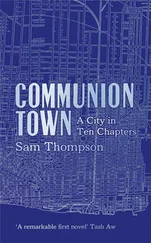Frank Tallis - Deadly Communion
Здесь есть возможность читать онлайн «Frank Tallis - Deadly Communion» весь текст электронной книги совершенно бесплатно (целиком полную версию без сокращений). В некоторых случаях можно слушать аудио, скачать через торрент в формате fb2 и присутствует краткое содержание. Жанр: Исторический детектив, на английском языке. Описание произведения, (предисловие) а так же отзывы посетителей доступны на портале библиотеки ЛибКат.
- Название:Deadly Communion
- Автор:
- Жанр:
- Год:неизвестен
- ISBN:нет данных
- Рейтинг книги:3 / 5. Голосов: 1
-
Избранное:Добавить в избранное
- Отзывы:
-
Ваша оценка:
- 60
- 1
- 2
- 3
- 4
- 5
Deadly Communion: краткое содержание, описание и аннотация
Предлагаем к чтению аннотацию, описание, краткое содержание или предисловие (зависит от того, что написал сам автор книги «Deadly Communion»). Если вы не нашли необходимую информацию о книге — напишите в комментариях, мы постараемся отыскать её.
Deadly Communion — читать онлайн бесплатно полную книгу (весь текст) целиком
Ниже представлен текст книги, разбитый по страницам. Система сохранения места последней прочитанной страницы, позволяет с удобством читать онлайн бесплатно книгу «Deadly Communion», без необходимости каждый раз заново искать на чём Вы остановились. Поставьте закладку, и сможете в любой момент перейти на страницу, на которой закончили чтение.
Интервал:
Закладка:
‘The idea that we possess a double most probably originates from our earliest experience of reflections. In a mirror, we see ourselves as something separate, removed; however, this illusion must have preceded the invention of the looking-glass. Our primitive ancestors would have viewed their “doubles” in the surface of still water — or even as a tiny homunculus in the eyes of others. Thus, as soon as human beings could form the concept of self, experience of reflections would have suggested the existence of another self. We must conclude, therefore, that the idea of the double is deeply rooted in the human psyche.’
Freud seemed pleased with this initial exposition, and smiled before continuing: ‘Now, let us turn our attention to religious teachings. In all cultures, the idea of the double appears in the guise of a soul — a spiritual doppelganger. And wherever we find religion, we also find the terror of oblivion. So …’ He paused to produce another volcanic cloud. ‘It is possible that the double represents a defence against the destruction of the ego, as the soul — the first double of the body — is an insurance against annihilation. The operation of this defence is evident in the burial rites of ancient Egypt, where it was commonplace to make images of the dead in lasting materials.’ Freud pointed to a tiny bronze box with the figurine of a bird on its lid. ‘See here: this coffin for a sacred animal. Late period. Between about seven hundred and three hundred BC.’ He was unable to resist stroking the falcon’s beak. ‘The desire for eternal life springs from the soil of unbounded self-love, from the primary narcissism which dominates the mind of the child and of primitive man. But when this stage has been surmounted, the double reverses its aspect. From having been an assurance of immortality it becomes an uncanny harbinger of death. It is in this form that the double is better known to the German-speaking peoples.’
The professor took another cigar from his cigar box.
‘And there may be another process at work: it may be that material offensive to the ego — unacceptable fantasies, all the strivings of the ego which adverse external circumstances have crushed, and all our suppressed acts of volition — are projected outwards to something foreign. But such material cannot be disowned completely, and the object into which this undesirable material is incorporated takes the form of another self.’
Liebermann wanted to discuss this point further, but the professor had returned to an earlier theme: ‘Doubling as a preservation against extinction also has its counterpart in the language of dreams. If one of the ordinary symbols for a penis — a tower, let us say — occurs in a dream doubled — thus, two towers — the doubling must be regarded as the warding-off of castration.’
Freud picked up another cigar and lit it. He was about to put the used match in his ashtray when he noticed that he had not finished the cigar he had been smoking. He had simply put it down for a few moments and forgotten that it was there.
‘Mmm … two cigars,’ he muttered.
His expression darkened, and with evident unease he stubbed out his old cigar and put the new one into his mouth.
25
Rheinhardt was seated next to his wife Else, and further down the park bench his eldest daughter, Therese, was reading a book. His younger daughter, Mitzi, was deliberating with another girl whether or not to get on the merry-go-round (which had been commandeered by two boys wearing short trousers and flat caps). A group of mothers, dressed rather too finely for the occasion, were conversing in the shade of a tree, while two nursemaids rocked perambulators in order to keep the tiny occupants asleep.
‘I was speaking to Frau Gaul this morning,’ said Else. ‘She went to the opera on Saturday to see Pagliacci. She said it was wonderful.’
Since the discovery of Adele Zeiler’s body in the Volksgarten, Rheinhardt had had few opportunities to spend time with his family. The normality of sitting in the park with his wife and daughters was like a spiritual emollient.
‘Would you like to go?’
‘Yes,’ Else replied, somewhat surprised by her husband’s response. He was always so busy that it had not occurred to her that he might act on Frau Gaul’s recommendation.
‘Then we shall go.’ Rheinhardt paused for a moment before adding, ‘In fact, we’ll all go — and to blazes with the expense. Would you like to see Pagliacci, Therese?’
His daughter looked up from her book, making heroic efforts to hide her excitement. In actuality she had not been reading at all, only pretending to do so while listening to her parents’ conversation.
‘Yes, father, very much.’
Therese’s composure reminded Rheinhardt that his daughter was on the cusp of adulthood. Once the transition was complete, the child whose hair he had kissed and whose little hand had gripped his forefinger so tightly in front of the lion’s cage at the zoo would be gone. It was a loss that he accepted philosophically, but to which a part of him would never be fully reconciled.
‘Good,’ he said decisively. ‘I’ll get some tickets this evening.’
Rheinhardt felt his wife’s hand covering his own. She squeezed his fingers together and by means of this subtle gesture communicated more gratitude and affection than could ever be expressed using words. The fact that something so consequential could pass between them in a public place, without notice, was further evidence — as far as Rheinhardt was concerned — of the miraculous nature of his marriage.
‘Is it a very long opera?’ asked Therese, craning forward in readiness for her father’s answer.
‘No, my dear,’ Rheinhardt replied. ‘It is very short.’
Therese gave a curt nod signalling her approval and applied herself once again to the task of simulated reading.
On the other side of the children’s enclosure, through the wooden struts and bars of a climbing frame, Rheinhardt noticed a man seated on his own. He was middle-aged, wore a long coat, and sported a shaggy moustache. He was looking at Mitzi and her play-friend, who were now enjoying the reciprocal motion of the see-saw.
Else had started to ponder the logistics of going to the opera, a string of considerations, not obviously connected. Rheinhardt was listening, but his attention kept on returning to the man opposite. Why, he wondered, was the man looking so intently in the direction of his daughter?
‘Who is that girl? Mitzi’s play-friend?’
Mention of her sister made Therese look up from her book.
‘Her name is Eva,’ Else replied, puzzled.
‘And who is she with?’
‘Her mother, Frau Kubauer. She’s over there, wearing the yellow dress.’ Else pointed out one of the women standing under the tree. At that moment, Frau Kubauer happened to look in their direction and Else was obliged to turn her indicating gesture into a polite wave. The woman in the yellow dress waved back. Rheinhardt raised his hat respectfully.
Else angled her head and awaited an explanation for her husband’s inquiry; however, he remained silent. With an indifferent shrug of her shoulders she returned to her original theme.
Rheinhardt had stopped listening. He was working out which children were accompanied by which adults. It became evident that the man sitting opposite was alone. Rheinhardt studied the cast of his face.
Rainmayr’s studio.
Images.
Two young girls, with skirts hoisted, proudly displayed their pudenda; a pair of disembodied skinny legs in loose stockings and garters …
Mitzi and her friend had abandoned the see-saw and were running towards the climbing frame. They began their ascent and as they did so the man’s eyes narrowed: he was looking at their ankles — their shoes — and as they ascended, he seemed to slide lower down in his seat. His tongue moistened his lips. His right hand — thrust into the deep pocket of his coat — was conspicuously active.
Читать дальшеИнтервал:
Закладка:
Похожие книги на «Deadly Communion»
Представляем Вашему вниманию похожие книги на «Deadly Communion» списком для выбора. Мы отобрали схожую по названию и смыслу литературу в надежде предоставить читателям больше вариантов отыскать новые, интересные, ещё непрочитанные произведения.
Обсуждение, отзывы о книге «Deadly Communion» и просто собственные мнения читателей. Оставьте ваши комментарии, напишите, что Вы думаете о произведении, его смысле или главных героях. Укажите что конкретно понравилось, а что нет, и почему Вы так считаете.












